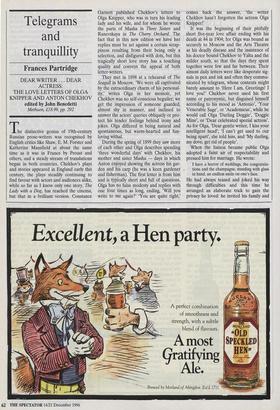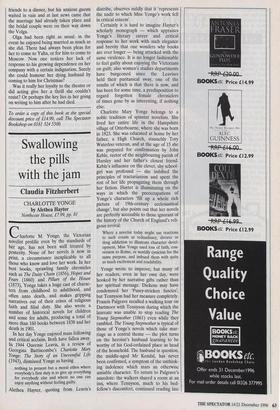Telegrams and tranquillity
Frances Partridge
DEAR WRITER. . . DEAR ACTRESS: THE LOVE LETTERS OF OLGA KNIPPER AND ANTON CHEKHOV edited by John Benedetti Methuen, £18.99, pp. 292 he distinctive genius of 19th-century Russian prose-writers was recognised by English critics like Shaw, E. M. Forster and Katherine Mansfield at about the same time as it was in France by Proust and others, and a steady stream of translations began in both countries. Chekhov's plays and stories appeared in England early this century, the plays steadily continuing to find favour with actors and audiences alike, while so far as I know only one story, The Lady with a Dog, has reached the cinema, but that in a brilliant version. Constance Garnett published Chekhov's letters to Olga Knipper, who was in turn his leading lady and his wife, and for whom he wrote the parts of Masha in Three Sisters and Ranevskaya in The Cheny Orchard. The fact that in this new edition we have her replies must be set against a certain scrap- piness resulting from their being only a selection, and disfigured with dots, but this tragically short love story has a touching quality and conveys the appeal of both letter-writers.
They met in 1898 at a rehearsal of The Seagull in Moscow. 'We were all captivated by the extraordinary charm of his personal- ity,' writes Olga in her memoir, yet Chekhov was no self-conscious beguiler; we get the impression of someone guarded, almost shy in manner, and inclined to answer the actors' queries obliquely or pro- tect his tender feelings behind irony and jokes. Olga differed in being natural and spontaneous, but warm-hearted and fun- loving withal.
During the spring of 1899 they saw more of each other and Olga describes spending 'three wonderful days' with Chekhov, his mother and sister Masha — days in which Anton enjoyed showing the actress his gar- den and his carp (he was a keen gardener and fisherman). The first letter is from him and is typically short and full of questions. Olga has no false modesty and replies with one four times as long, ending, Will you write to me again?' You are quite right,' comes back the answer, 'the writer Chekhov hasn't forgotten the actress Olga ICnipper!'
It was the beginning of their pitifully short five-year love affair ending with his death at 44 in 1904; for Olga was bound as securely to Moscow and the Arts Theatre as his deadly disease and the insistence of his doctor bound Chekhov to Yalta and the milder south, so that the days they spent together were few and far between. Their almost daily letters were like desperate sig- nals in pen and ink and often they commu- nicated by telegram, whose contents might barely amount to 'Here I am. Greetings! I love you!' Chekhov never used his first name or patronymic, but disguised himself according to his mood as 'Antonio', 'Your Venerable Sage', or 'Academicus', while he would call Olga 'Darling Doggie', 'Doggie Mine', or 'Dear celebrated special actress'. As for Olga, 'Dear gentle writer, I kiss your intelligent head'; 'I can't get used to our being apart', she told him, and 'My darling, my dove, get rid of people'.
When the liaison became public Olga adopted a faint air of respectability and pressed him for marriage. He wrote: I have a horror of weddings, the congratula- tions and the champagne, standing with glass in hand, an endless smile on one's face.
He had always teased and joked his way through difficulties and this time he arranged an elaborate trick to gain the privacy he loved: he invited his family and friends to a dinner, but his anxious guests waited in vain and at last news came that the marriage had already taken place and the bridal couple were on their way down the Volga.
Olga had been right as usual: in the event he enjoyed being married as much as she did. There had always been pleas for her to come to Yalta, or for him to come to Moscow. Now one notices her lack of response to his growing dependence on her company with a certain indignation. Surely she could humour her dying husband by coming to him for Christmas?
Was it really her loyalty to the theatre or did acting give her a thrill she couldn't resist? Or perhaps the key lies in her going on writing to him after he had died.
To order a copy of this book at the special discount price of £14.99, call The Spectator Bookshop on 0181 324 5500.



















































































































 Previous page
Previous page